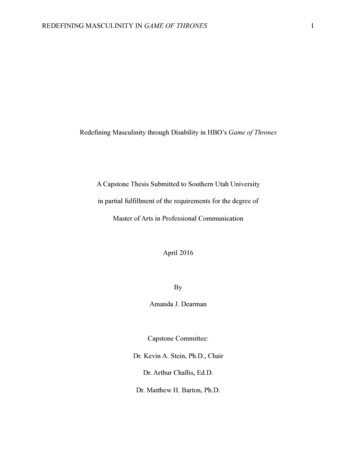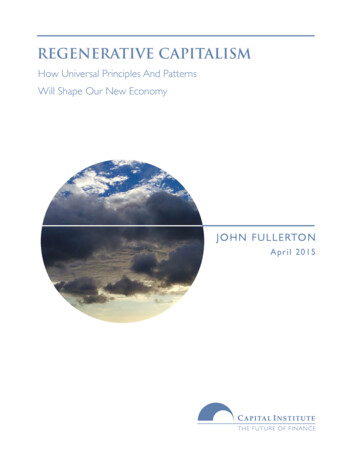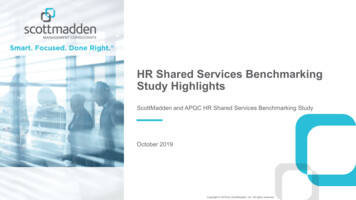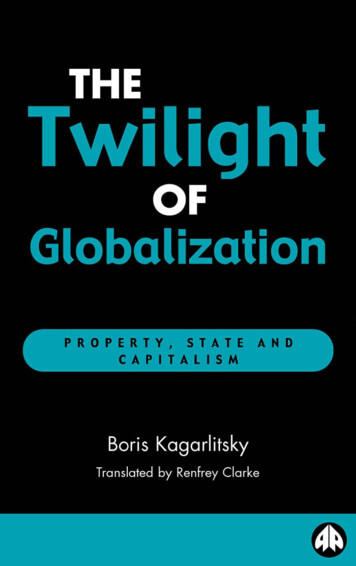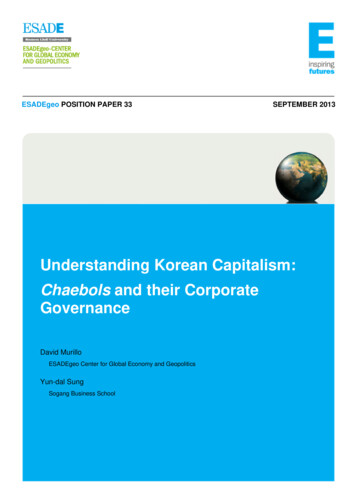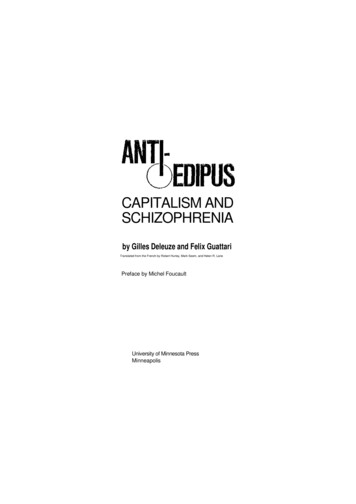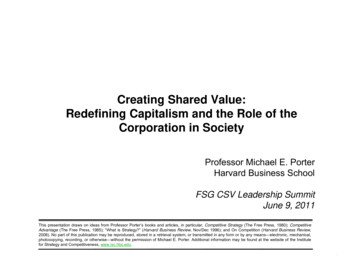
Transcription
Creating Shared Value:Redefining Capitalism and the Role of theCorporation in SocietyProfessor Michael E. PorterHarvard Business SchoolFSG CSV Leadership SummitJune 9, 2011This presentation draws on ideas from Professor Porter’s books and articles, in particular, Competitive Strategy (The Free Press, 1980); CompetitiveAdvantage (The Free Press, 1985); “What is Strategy?” (Harvard Business Review, Nov/Dec 1996); and On Competition (Harvard Business Review,2008). No part of this publication may be reproduced, stored in a retrieval system, or transmitted in any form or by any means—electronic, mechanical,photocopying, recording, or otherwise—without the permission of Michael E. Porter. Additional information may be found at the website of the Institutefor Strategy and Competitiveness, www.isc.hbs.edu.20110608 – FSG Summit – FINAL – prepared by RA Stacie Rabinowitz1Copyright 2011 Professor Michael E. Porter
The Role of Business in Prosperity Only business can create prosperityBUT Companies are increasingly perceived to be prospering at the expenseof the broader community Business increasingly is seen as a major cause of social,environmental, and economic problems Government and civil society often attempt to address societal issues atthe expense of business Despite growing corporate social responsibility (CSR) activities, thelegitimacy of business has fallen20110608 – FSG Summit – FINAL – prepared by RA Stacie Rabinowitz2Copyright 2011 Professor Michael E. Porter
The Concept of Shared ValueShared Value: Corporate policies and practices thatenhance the competitiveness of a company whilesimultaneously advancing social and economicconditions in the communities in which it operates Create economic value by creating societal value̶What is good for the community is good for business All profit is not equal. Profit involving shared value enablessociety to advance more rapidly and allows companies to growfaster The pursuit of shared value represents the next evolution ofcapitalism Concern with societal issues will be a defining characteristic ofthe post-crisis era Incorporating societal issues into strategy and operations is thenext major transformation in management thinking20110608 – FSG Summit – FINAL – prepared by RA Stacie Rabinowitz3Copyright 2011 Professor Michael E. Porter
Misconceptions About Creating Shared ValueCreating Shared Value is NOT: Sharing created value Philanthropy Giving back Ethics Personal values Harm reduction (Just) sustainability Triple bottom line Balancing stakeholder interests20110608 – FSG Summit – FINAL – prepared by RA Stacie Rabinowitz4Copyright 2011 Professor Michael E. Porter
Levels of Shared Value Reconceiving customer needs, products, and markets Redefining productivity in the value chain Enabling local cluster development20110608 – FSG Summit – FINAL – prepared by RA Stacie Rabinowitz5Copyright 2011 Professor Michael E. Porter
Reconceiving Products and Markets Design products and services to address societal needs– E.g., environmental impact, safety, health, education, nutrition, living with disability,housing, financial security Open new markets by serving unmet needs in underserved communities– Often requires redesigned products or different distribution methods Meeting such needs spurs self-reinforcing economic growth Businesses have the potential to be more effective than governments and NGOs inmarketing solutions to social problems Shared value offers new opportunities for differentiation, innovation, and growth A new generation of social entrepreneurs is capturing these opportunities, oftenfaster than mainstream businesses20110608 – FSG Summit – FINAL – prepared by RA Stacie Rabinowitz6Copyright 2011 Professor Michael E. Porter
Creating Shared Value in ProductsDow Chemical: Insect ControlThe SpinetoramTM Family of insect control products represent an innovative insect control technology derived from a biological organism(natures own) that provides control of a broad spectrum of insect pests in a variety of crops.Social Impact Ability to be applied at lower rates thanconventional insecticides Low impact on beneficial insects Natural degradation through UV light and soilmicrobes Low solubility in water Favorable toxological profile Carries lowest human hazard label Organic version availableBusiness Impact Substantial growth product since launch,recording double-digit growth in 201020110608 – FSG Summit – FINAL – prepared by RA Stacie Rabinowitz7Copyright 2011 Professor Michael E. Porter
Creating Shared Value in ProductsIntuit Intuit Health Debit Card allows small employers who cannot affordhealth insurance to provide pre-tax healthcare support to theiremployees– Card automatically recognizes healthcare expenditures vs. other kinds ofspending– Unspent funds roll over year to year SnapTax provides low-income consumers with access to tax preparationservices over the phone and enables rapid refunds– 15 minutes for 15, electronic filing included– Data extracted from mobile phone photos of W-2s via optical characterrecognition– Debit card option for direct deposit of refunds for unbanked households– Simple IRA option to enable use of refund for retirement savings20110608 – FSG Summit – FINAL – prepared by RA Stacie Rabinowitz8Copyright 2011 Professor Michael E. Porter
Finding Product and Market Opportunitiesto Create Shared Value Redefine the business around unsolved customerproblems or concerns, not traditional product definitions Think in terms of improving lives, not just meetingconsumer needs Identify customer groups that have been poorly served oroverlooked by the industry’s products in both advanced andemerging markets Start with no preconceived constraints about productattributes, channel configuration, or the economic model ofthe business (e.g., small loans are unprofitable)20110608 – FSG Summit – FINAL – prepared by RA Stacie Rabinowitz9Copyright 2011 Professor Michael E. Porter
Redefining Productivity in the Value ChainFirm Infrastructure(e.g. Financing, Planning, Investor Relations)Human Resource Management(e.g. Recruiting, Training, Compensation System)Technology Development(e.g. Product Design, Testing, Process Design, Material Research, Market Research)MaProcurement(e.g. Components, Machinery, Advertising, Services)InboundLogisticsOperations(e.g. IncomingMaterialStorage, DataCollection,Service,CustomerAccess)(e.g. Assembly,ComponentFabrication,BranchOperations) 20110608 – FSG Summit – FINAL – prepared by RA Stacie RabinowitzrgOutboundLogisticsMarketing& SalesAfter-SalesService(e.g. . SalesForce,Promotion,Advertising,ProposalWriting, Website)(e.g. epair)inProcurementResource useEnergy useLogistical efficiencyEmployee productivityLocation of facilities and the supply chain10Copyright 2011 Professor Michael E. Porter
Identifying Opportunities for Shared Value in MiningThe Value Chain Enhancingpartnershipswith collegesanduniversities Value addingprocurementpractices Employment indisadvantagedregions Energy and water useWorker safety and labor practicesLimiting emissions and wasteBiodiversity and low ecological impactsMinimizing effects of hazardous materialsRecover additional materials from “exhausted”mines20110608 – FSG Summit – FINAL – prepared by RA Stacie Rabinowitz11 Minimizinglogisticalimpacts Recruiting fromdisadvantagedcommunities Diversity Employeeeducation andjob training Safe workingconditions Onsite housingso miners canbe close tofamilies Employeehealth Compensationand benefits tosupport lowincome workers Staff retrainingandrehabilitationafter mineclosesCopyright 2011 Professor Michael E. Porter
Redefining Productivity in the Value ChainFibria Pulp Manufacturing Fibria is a Brazilian company that is the world’s largest manufacturer of pulp for paper All production is based on planted eucalyptus– No use of tropical native trees– Conservation of native tree reserves (1/3 of the total area under eucalyptus cultivation)– Mosaics of native reserves within forests to insure biodiversity Uses soil science and forestry management to maximize the quantity and quality of organic matter found in the soil of itseucalyptus plantations State-of-the-art technologies for pollution control in the mills– All plantations certified by CER FLOR/ PE FC Support small-scale producers under forest partnership program Small-scale farmers are permitted to grow maize, beans and manioc in areas belonging to the company, under a programfostering cultivation of food crops within plantations 170,000 hectares of preserved native reserves interspersed with 286,000 hectares of eucalyptus plantations (more than37% of its planted areas) Areas covered with native vegetation are fundamental for ensuring ecosystem balance and the maintenance ofbiodiversity Studies have concluded that there has been minimal negative impact due to eucalyptus plantations Helps reduce agriculture inputs needed, incidence of pest / disease 4,000 households currently obtain income from eucalyptus production by selling wood to Fibria under a forestpartnership program Fibria benefits as well since 1 hectacre of planted eucalyptus can produce about the same volume of wood as 30hectacre of native forest20110608 – FSG Summit – FINAL – prepared by RA Stacie Rabinowitz12Copyright 2011 Professor Michael E. Porter
Shared ValueBuildingThroughLocalLocalClustersCluster DevelopmentImproving Deficits in the Business Environment A strong local cluster with capable local suppliers and institutionsimproves company productivity– e.g., greater supply chain efficiency, lower environmental impact, and betteraccess to skills Companies, working collaboratively, can catalyze major improvements inthe local cluster and the local business environment Local cluster development strengthens the link between a company’ssuccess and community success What suppliers are inefficient or missing locally? What institutional weaknesses or community deficits create internalcosts for the firm?20110608 – FSG Summit – FINAL – prepared by RA Stacie Rabinowitz13Copyright 2011 Professor Michael E. Porter
Shared Value Through Cluster DevelopmentCisco Networking AcademyCisco, the world’s leading producer of network routers, has established aprogram to train network operators in economically deprived regionsSocial ImpactBusiness Problem and Innovation Over 10,000 Academies established in all 50states and 165 countries Cisco’s growth is limited by the number oftrained network administrators worldwide Over 4,000,000 students have been trained,while 750,000 students are now considered“Cisco certification ready” As a result, Cisco established theNetworking Academy to address this keybusiness challenge More than 50% of graduates have found anew job, and 70% have attained a new job, abetter job, increased responsibility, orhigher salary Developed a distance learningprogram that combines a web-basedcurriculum with local instructors and labfacilities to train new networkadministratorsBusiness Impact The Networking Academy alleviates a keylabor constraint for Cisco customers Partnered with industry peers such asHP, Panduit, and others Trained network administrators becomefamiliar with Cisco products Implemented the Networking Academyin secondary schools, primarily locatedin economically deprived regions20110608 – FSG Summit – FINAL – prepared by RA Stacie Rabinowitz The Networking Academy has strengthenedrelationships with key suppliers, localbusinesses and government14Copyright 2011 Professor Michael E. Porter
Local Cluster DevelopmentAnglo-American Anglo American has established Anglo Zimele, a South African enterpriseinvestment fund, for mining-related small and medium-sized businesses inSouth Africa As of 2010, the fund had invested in 509 businesses, which collectively employed9,514 people with annual revenues of 215 millionCommunity value 10,000 new jobs created Spillover effects of these new businesses in their communities Significant increase in income for SME employees and ownersEconomic value Anglo-American has created reliable, high-quality local suppliers A deeper pool of local suppliers reduces transaction costs and improves servicelevels and quality20110608 – FSG Summit – FINAL – prepared by RA Stacie Rabinowitz15Copyright 2011 Professor Michael E. Porter
Moving to Shared ValueCSRCSV Values: “doing good” Good citizenship,philanthropy, andsustainabilityDiscretionarySeparate from profitmaximizationAgenda externallydeterminedImpact is limited by thecorporate footprint andCSR budgetExample: Fair tradepurchasing Value: economic andsocietal benefits relativeto costJoint company andcommunity value creationIntegral to competingEssential to profitmaximizationAgenda is businessspecificMobilizes the entirecompany budgetExample: Transformingprocurement to increasequality and yieldIn both cases, compliance with laws and ethical standardsand reducing harm for corporate activities are assumed20110608 – FSG Summit – FINAL – prepared by RA Stacie Rabinowitz16Copyright 2011 Professor Michael E. Porter
Moving to Shared ValueNovartisCSRCSV Donate drugs to lower-incomepopulations Arogya Parivar: Implementing anew drug distribution channel forlow-income populations Same products, but free or at adiscounted price New quantity, packaging, patienteducation, and distribution Provides product access foraffected individuals Improvement in local healthcaredelivery infrastructure Learning about customer behaviorand new business models Expanded revenue and profitablebusiness model Reduced revenue at the samecost20110608 – FSG Summit – FINAL – prepared by RA Stacie Rabinowitz17Copyright 2011 Professor Michael E. Porter
Adding a Social Dimension to Strategy Shared value opens up new needs, new markets, and new valuechain configurations This creates new strategic positions, and new opportunities forextending existing positions Companies should incorporate a social dimension to their valueproposition Shared value can reinforce and even anchor a company’s strategy The social dimension of strategy can be more sustainable vs.competitors than conventional cost and quality advantages20110608 – FSG Summit – FINAL – prepared by RA Stacie Rabinowitz18Copyright 2011 Professor Michael E. Porter
Shared Value and Strategic PositioningWhole Foods MarketsDistinctiveActivitiesValue Proposition Natural, fresh, organic, and prepared foods and healthitems with excellent service at premium prices Cater to specialized nutritional requirements (glutenallergies, vegan, etc.) Educated, middle class, and affluent customers who arepassionate about food and a healthy lifestyle Well-lit, inviting supermarket store formats withappealing displays and extensive prepared foodssectionsProduce section as “theater”Café-style seating areas with wireless internet formeals and meetingsEach store carries local produce and has the authorityto contract with the local farmers. Company provideslow-interest loans and microcredit if neededInformation and education provided to shoppers alongwith productsHigh touch in-store customer service viaknowledgeable, flexible, and highly motivatedpersonnelFlat compensation structureOwn seafood procurement and processing facilities tocontrol quality (and price) from the boat to the counterHeavy emphasis on environmental sustainability in allactivities.Emphasis on supporting community development Successful strategies in the future will embody a significant shared value dimension20110608 – FSG Summit – FINAL – prepared by RA Stacie Rabinowitz19Copyright 2011 Professor Michael E. Porter
The Purpose of Business There is an opportunity to transform thinking and practice about the role ofthe corporation in society Shared value gives rise to far broader approaches to economic valuecreation Shared value thinking will drive the next wave of innovation, productivityenhancement, and economic growth Businesses acting as businesses, not as charitable givers, are arguably themost powerful force for addressing many of the pressing issues facing oursociety A transformation of business practice around shared value will give purposeto the corporation and represents our best chance to legitimize businessagain20110608 – FSG Summit – FINAL – prepared by RA Stacie Rabinowitz20Copyright 2011 Professor Michael E. Porter
Anglo-American Anglo American has established Anglo Zimele, a South African enterprise investment fund, for mining-related small and medium-sized businesses in South Africa As of 2010, the fund had invested in 509 businesses, which collectively employed 9,514 people with annual revenues of 215 million Community value
